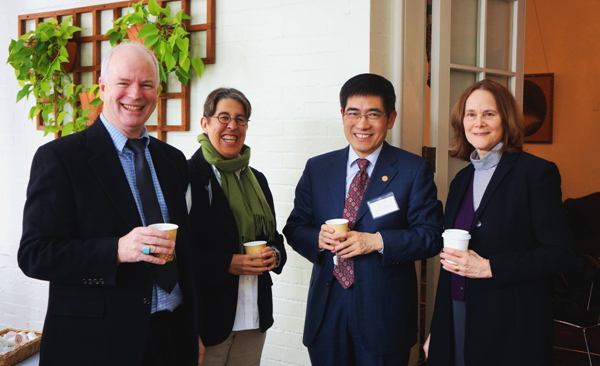"Memory: Comparative Approaches to Culture," the second conference sponsored by the Cornell/East China Normal University Center for Comparative Culture, was held at the A.D. White House of Cornell University on Feb. 1-3. The conference brought together scholars from East China Normal University (ECNU) and Cornell, and addressed postcolonial legacies, memorial responsibilities, future memory, social memory, televisual time, and memory and reason.

ECNU/Cornell Center for Comparative Culture, the collaboration between ECNU and Cornell began in 2008 as a response to globalization and its effect on arts and humanities fields. Its first interdisciplinary conference, on the future of the humanities, was held in 2009 in ECNU.
The ECNU/Cornell Center for Comparative Culture fosters collaborative and innovative research among faculty and graduate students "who are committed to reflecting on the deep imprint of culture on intellectual engagement across the globe," said Timothy Murray, director of Cornell's Society for the Humanities. "Study of comparative cultures grounded in the perspective of the humanities and arts will open new avenues for shared cross-cultural expression between China and its Western intellectual partners."
Conference's talks featured "research approaches to the arts and creative expression that position the study of memory firmly on the complex ground of culture," said Murray. ECNU participants included Tong Shijun, professor of philosophy and Chairman of the ECNU University Council, and professors Wenjin Liu, Ming Wu, Wei Luo, Minjie Li and Junsong Chen. Their talks covered such topics as Internet catch phrases, the rhetoric of social media in the climate of censorship and regulation, media studies and Chinese reality television.
Cornell participants included Naoki Sakai, professor of Asian studies and comparative literature; Elizabeth Anker, professor of English; Patricia Keller, Department of Romance Studies and Society for the Humanities fellow; and Nick Salvato, professor of performing and media arts and director of the Feminist, Gender and Sexuality Studies Program.
"The strong presence of film and television as objects or media for the investigation of memory [at the] conference testifies to the degree to which media and digital culture pose some of the most powerful questions within our theme. As technical supports to consciousness and memory, as modes of experience and interface, as regulators of social possibility, and as widely shared aesthetic and formal systems." said Amy Villarejo, who is on leave as chair of the Department of Performing and Media Arts (PMA) and co-director of ECNU/Cornell Center for Comparative Culture.
Source: ECNU News

